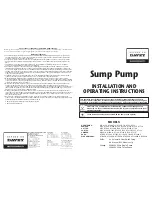
www.stenner.com
26
TUBE REPLACEMENT – SAFETY INFORMATION
RISK OF CHEMICAL EXPOSURE
To reduce risk of exposure, check the pump tube regularly for leakage. At the first
sign of leakage, replace the pump tube.
To reduce risk of exposure, the use of proper personal protective equipment is
mandatory when working on or near chemical metering pumps.
To reduce risk of exposure, and also prior to service, shipping, or storage, pump
generous amounts of water or a compatible buffer solution to remove chemical
from pump.
Consult chemical manufacturer and MSDS sheet for additional information and
precautions for the chemical in use.
Personnel should be skilled and trained in the proper safety and handling of the
chemicals in use.
Inspect tube frequently for leakage, deterioration, or wear. Schedule a regular pump
tube maintenance change to prevent chemical damage to pump and/or spillage.
PINCH POINT HAZARD
Use extreme caution when replacing pump tube. Be careful of your fingers and do
not place fingers near rollers.
HAZARDOUS PRESSURE/CHEMICAL EXPOSURE
Use caution and bleed off all resident system pressure prior to attempting service
or installation.
Use caution when disconnecting discharge line from pump. Discharge may be under
pressure. Discharge line may contain chemical.
NOTICE: Indicates special instructions or general mandatory action.
NOTICE: DO NOT
apply grease, oil, or lubricants to the pump tube or housing.
NOTICE:
Prior to pump tube replacement, inspect the entire pump head for cracks
or damaged components. Ensure rollers turn freely.
NOTICE:
Rinse off chemical residue and clean all chemical and debris from pump
head components prior to tube replacement. Apply AquaShield
®
to main shaft
and tube housing cover bushing during tube replacement.
NOTICE: DO NOT
pull excessively on pump tube. Avoid kinks or damage during
tube installation.
NOTICE:
Inspect the suction and discharge lines, injection point (into pipe), and
injection check valve duckbill for blockages after any tube rupture. Clear or replace
as required.
















































